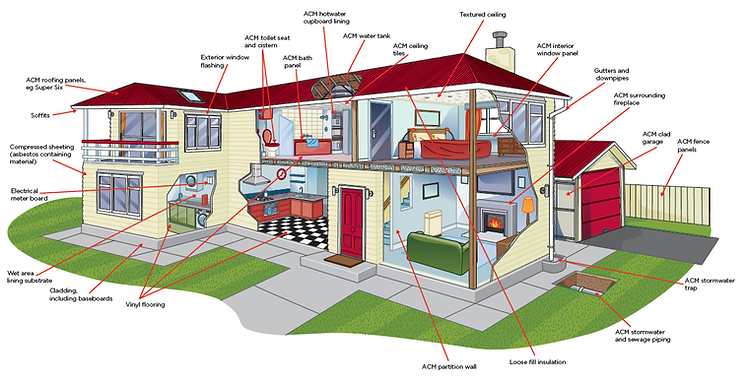Asbestos, a mineral known for its fire-resistant and insulating properties, was widely used in construction until its health hazards became evident.
It’s crucial to identify asbestos in your Ballarat, Bendigo and Shepparton properties to ensure safety. In this article, we’ll guide you on how to spot asbestos hazards effectively.
Understanding Asbestos
Before diving into asbestos detection, let’s discuss what asbestos is and why it poses such a threat.
What is Asbestos?
Asbestos is a naturally occurring mineral known for its heat resistance and durability. It was commonly used in building materials until it was linked to serious health issues.
Health Hazards
Exposure to asbestos fibres can lead to severe health conditions such as asbestosis, lung cancer, and mesothelioma. Therefore, identifying and managing asbestos in your property is crucial for health and safety.
The Common Culprits
This section will explore where asbestos is typically found in buildings.
1. Tile Underlay – Wet Areas
Commonly found in bathrooms, laundries, kitchens and toilets due to its water-resistant properties, your home may have asbestos in the walls or maybe hiding behind tiles.
2. External Cladding & Roofing
Asbestos was frequently used in roofing materials. Inspect your roof for any signs of asbestos-containing products. Even if you think there might be asbestos, hire a professional asbestos company to do a thorough test on your home or building.
Identifying and Spotting Asbestos Hazards
Now, let’s discuss how to recognise potential asbestos hazards.
3. Visual Inspection
Start with a visual inspection. Check for any materials that appear weathered, damaged, or deteriorated, as these may contain asbestos.
4. Age of the Property
Properties built before the 1990s are more likely to contain asbestos. The older the property, the higher the risk.
Professional Asbestos Testing
To ensure a comprehensive inspection, consider professional assistance.
5. Asbestos Testing
Engage a licensed asbestos inspector to perform testing on suspected materials. This will provide conclusive evidence of whether your property has any asbestos present
6. Sampling
Sampling involves taking small pieces of material and sending them to a laboratory for analysis. This method is accurate and reliable.
Managing Asbestos Hazards
Now that you’ve identified asbestos hazards, let’s look at how to manage them.
7. Leave it to the Professionals
Handling asbestos materials is dangerous. Always hire licensed asbestos removalists for removal and disposal.
8. Encapsulation
In some cases, asbestos can be encapsulated to prevent fibre release. A professional can advise you on this.
Legal Requirements
Understanding the legal aspects is crucial when dealing with asbestos in your state or local council.
9. Regulations
Be aware of local regulations regarding asbestos removal. Non-compliance can lead to serious fines and legal issues.
10. Documentation
Maintain detailed records of asbestos testing and removal for future reference.
The Importance of Asbestos Awareness
11. Health and Safety
Awareness of asbestos hazards ensures the safety of your family and property occupants.
12. Property Value
Being proactive about asbestos can positively impact your property’s value and marketability.
Conclusion
Spotting asbestos hazards in your Bendigo and Shepparton property is essential for the health and safety of all residents. Understanding where asbestos might be hiding and how to manage it can make a significant difference.
FAQs
1. Is asbestos common in older homes?
Asbestos is more commonly found in homes built before the 1990s due to its widespread use in construction materials at that time.
2. Can I remove asbestos on my own?
It’s highly recommended not to attempt asbestos removal on your own. Engage certified professionals for safe removal.
3. How does asbestos testing work?
Asbestos testing involves taking samples of suspected materials and sending them to a laboratory for analysis, determining asbestos presence.
4. What are the health risks associated with asbestos exposure?
Asbestos exposure can lead to severe health conditions, including asbestosis, lung cancer, and mesothelioma.
5. What are the legal consequences of improper asbestos removal?
Improper asbestos removal can lead to legal issues and fines. It’s essential to adhere to local regulations and engage professionals for safe removal.


